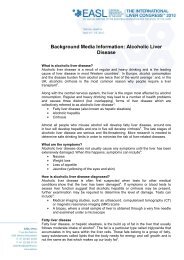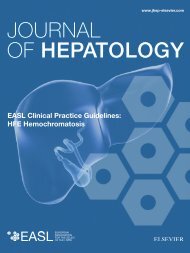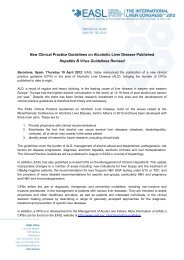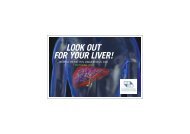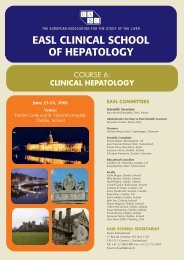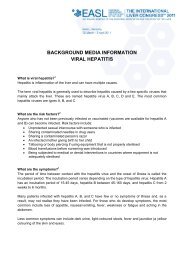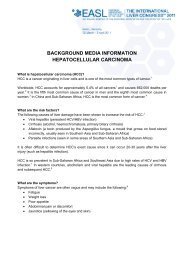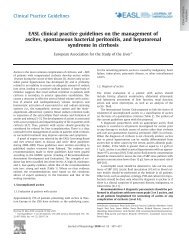barcelona . spain - European Association for the Study of the Liver
barcelona . spain - European Association for the Study of the Liver
barcelona . spain - European Association for the Study of the Liver
You also want an ePaper? Increase the reach of your titles
YUMPU automatically turns print PDFs into web optimized ePapers that Google loves.
BARCELONA . SPAIN<br />
140 POSTGRADUATE COURSE SYLLABUS ALCOHOLIC LIVER DISEASE 141<br />
APRIL 18 - 19/2012 THE INTERNATIONAL LIVER CONGRESS TM 2012<br />
PATIENTS WITH ALCOHOLIC LIVER DISEASE AND LIVER<br />
TRANSPLANTATION: SPECIFIC ISSUES<br />
Patrizia Burra<br />
Padova, Italy<br />
E-mail: burra@unipd.it<br />
KEY POINTS<br />
• Outcomes <strong>of</strong> liver transplantation <strong>for</strong> alcohol-related cirrhosis are comparable with those <strong>of</strong><br />
liver transplantation <strong>for</strong> o<strong>the</strong>r aetiologies.<br />
• Most transplant programs in <strong>the</strong> US and Europe consider acute alcoholic hepatitis a<br />
contraindication to liver transplantation. However early liver transplantation in selected patients<br />
with a first episode <strong>of</strong> severe alcoholic hepatitis not responding to medical <strong>the</strong>rapy has been<br />
shown to improve survival.<br />
• The role <strong>of</strong> <strong>the</strong> length <strong>of</strong> pre-transplantation abstinence, <strong>the</strong> so called “6-month rule”, as<br />
predictor <strong>of</strong> post-transplantation abstinence is still controversial.<br />
• A psycho-social assessment to establish <strong>the</strong> likelihood <strong>of</strong> long-term abstinence after liver<br />
transplantation should be per<strong>for</strong>med in patients with alcoholic liver disease considered<br />
potential candidates <strong>for</strong> liver transplantation.<br />
• Alcohol relapse after liver transplantation <strong>for</strong> alcoholic cirrhosis ranges between 10% and 50%<br />
in up to 5 years follow-up, according to <strong>the</strong> method used to assess alcohol relapse.<br />
• Overall quality <strong>of</strong> life and employment levels appear similar between patients transplanted <strong>for</strong><br />
alcoholic and non-alcoholic liver disease. However <strong>the</strong> incidence <strong>of</strong> deaths due to all social<br />
causes has been shown to be double in patients with an alcoholic etiology <strong>of</strong> liver disease,<br />
compared to o<strong>the</strong>r etiologies.<br />
INTRODUCTION<br />
Alcoholic liver disease is one <strong>of</strong> <strong>the</strong> most common causes <strong>of</strong> cirrhosis and indications <strong>for</strong> liver transplantation<br />
in Europe and North America [1-3]. Despite <strong>the</strong> results <strong>of</strong> liver transplantation <strong>for</strong> alcohol-related cirrhosis<br />
are comparable with those <strong>of</strong> liver transplantation <strong>for</strong> o<strong>the</strong>r aetiologies, alcoholic liver disease has been<br />
considered a controversial indication to liver transplantation. The reluctance to transplant alcoholics stems<br />
in part from <strong>the</strong> view that alcoholics bear responsibility <strong>for</strong> <strong>the</strong>ir illness [3] and <strong>the</strong>re is also <strong>the</strong> perception<br />
that <strong>the</strong> alcoholic person is likely to relapse into alcohol use after transplantation and <strong>the</strong>reby damage <strong>the</strong><br />
allograft.<br />
ALCOHOLIC LIVER DISEASE AND INDICATION FOR LIVER TRANSPLANTATION<br />
<strong>Liver</strong> transplantation in patients with alcoholic cirrhosis was first acknowledged in 1983 [4]. Poynard et al.<br />
[5] showed that <strong>the</strong>re was a survival benefit when patients with advanced de-compensation (Child-Turcotte-<br />
Pugh score ranging between 11 and 15) underwent transplantation, whereas <strong>the</strong>re was no survival benefit<br />
when alcoholic patients with better compensated liver function were transplanted.<br />
Most <strong>of</strong> <strong>the</strong> patients with severe alcoholic hepatitis, whe<strong>the</strong>r occurring in <strong>the</strong> previously healthy liver or<br />
in patients with established cirrhosis, fail to recover despite abstinence and maximal medical <strong>the</strong>rapy.<br />
Most transplant programs in <strong>the</strong> US and Europe consider acute alcoholic hepatitis a contraindication to<br />
liver transplantation [6, 7]. However a recent multicenter study by Mathurin et al. [8] showed that early<br />
liver transplantation can improve survival in patients with a first episode <strong>of</strong> severe alcoholic hepatitis not<br />
responding to medical <strong>the</strong>rapy. Twenty-six patients with no prior episode <strong>of</strong> alcoholic hepatitis and with no<br />
response to medical <strong>the</strong>rapy or rapid worsening <strong>of</strong> liver function despiite medical treatment were selected<br />
after an adequate psychiatric and social evaluation. The cumulative 6-month survival rate was higher among<br />
patients who received early transplantation than among those who did not (77±8% vs. 23±8%; p



